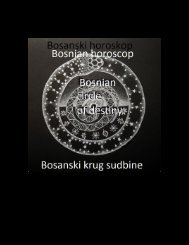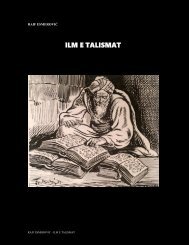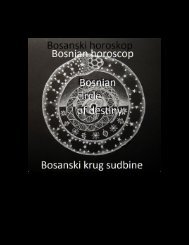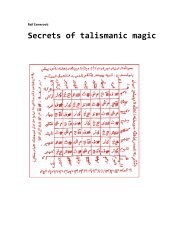Cult of fertility among the Bosnian People
In order to write credibly and in detail about the cult of fertility of the Bosnian people, it is necessary to start from the beginning which goes back to the ancient times and speaks about our famous forefathers the Illyrians, and one of their most important deities - snake. Namely, Illyrian cult of the snake as a primary symbol of fertility in folk religion of the Bosnian people, is not only noticeable in the belief about the home snake - protector of the family, i.e. totem of the head of the family, usually a male, i.e. father, but also her sacred meaning. The snake cult, on which the genesis of the grandfather of our forefathers is based on, has an even wider meaning and significance.
In order to write credibly and in detail about the cult of fertility of the Bosnian people, it is necessary to start from the beginning which goes back to the ancient times and speaks about our famous forefathers the Illyrians, and one of their most important deities - snake. Namely, Illyrian cult of the snake as a primary symbol of fertility in folk religion of the Bosnian people, is not only noticeable in the belief about the home snake - protector of the family, i.e. totem of the head of the family, usually a male, i.e. father, but also her sacred meaning. The snake cult, on which the genesis of the grandfather of our forefathers is based on, has an even wider meaning and significance.
- TAGS
- raif-esmerovic
Create successful ePaper yourself
Turn your PDF publications into a flip-book with our unique Google optimized e-Paper software.
people was avoided and <strong>the</strong>y tried<br />
to limit visits to <strong>the</strong> closest<br />
family members only. Reason for<br />
such a behaviour was manifold, but<br />
<strong>the</strong> most important one is for <strong>the</strong><br />
mo<strong>the</strong>r and child to rest and<br />
ga<strong>the</strong>r strength, since in such a<br />
state <strong>the</strong>y are more prone to<br />
negative effects or disease.<br />
Time after birth, usually during<br />
<strong>the</strong> following 40 days, though not<br />
limited by time, babine take place,<br />
ritual <strong>of</strong> gifting <strong>the</strong> new-born,<br />
but also his mo<strong>the</strong>r and even <strong>the</strong><br />
whole family. Babine are primarily<br />
a reflection <strong>of</strong> female solidarity<br />
and it needs to be characterised<br />
as a socio-humane gesture, with<br />
which one is showing concern <strong>of</strong><br />
<strong>the</strong> community for <strong>the</strong>ir new member.<br />
Besides, according to folk belief,<br />
this is <strong>the</strong> period when every day,<br />
during <strong>the</strong> 40 days, out <strong>of</strong> <strong>the</strong><br />
womb <strong>of</strong> <strong>the</strong> young mo<strong>the</strong>r one by<br />
one a postekija is being removed.<br />
It is believed that after a woman<br />
has given birth in her womb 40<br />
postekija are being laid, from<br />
which each day one <strong>of</strong> <strong>the</strong>m is<br />
being raised and removed. As<br />
postekija is a prayer mat we're<br />
probably talking about angels<br />
praying for <strong>the</strong> young mo<strong>the</strong>r and<br />
protecting her from attacks from<br />
all those evil creatures which are<br />
trying to harm her in this most<br />
delicate moment.<br />
Women went to babine on Monday and<br />
Thursday, usually before noon,<br />
while <strong>the</strong> sun is rising in <strong>the</strong> sky,<br />
wanting to bring positive<br />
influences besides <strong>the</strong> gift so<br />
that <strong>the</strong> child will develop in a<br />
healthy manner. Monday and<br />
Thursday are usually considered in<br />
<strong>Bosnian</strong> tradition as blessed days,<br />
since <strong>the</strong>y are located in front <strong>of</strong><br />
two holly days - Tuesday and<br />
Friday. While Tuesday was <strong>the</strong><br />
holly day <strong>of</strong> <strong>the</strong> Bogomils, Friday<br />
is a holly day in Islam.<br />
In Sandžak <strong>the</strong>re is a custom that<br />
people perform babine right after<br />
birth out <strong>of</strong> practical reasons, to<br />
<strong>of</strong>fer help, if <strong>the</strong>re is a need to<br />
do so, and check what <strong>the</strong> mo<strong>the</strong>r<br />
and <strong>the</strong> child need and <strong>the</strong>y bring<br />
it as gifts. As pregnancy, birth<br />
and time after it, were reserved<br />
exclusively for women and <strong>the</strong>ir<br />
activities since <strong>the</strong> old days, men<br />
were completely distanced from all<br />
activities, which is a rule forced<br />
by patriarchy. However, <strong>the</strong>re were<br />
certain situations when <strong>the</strong>y did<br />
get involved, at least during this<br />
last stage <strong>of</strong> fascinating ritual<br />
<strong>of</strong> new life, which could be<br />
characterised as "male babine",<br />
though <strong>the</strong>re is ano<strong>the</strong>r name for<br />
it - jedvoček. As <strong>the</strong> name itself<br />
reveals we're talking about a<br />
situation where a married couple<br />
is awaiting birth <strong>of</strong> a son or<br />
child generally for a long time.<br />
Raif Esmerović<br />
41<br />
<strong>Cult</strong> <strong>of</strong> <strong>fertility</strong> <strong>among</strong> <strong>the</strong> <strong>Bosnian</strong> <strong>People</strong>

















